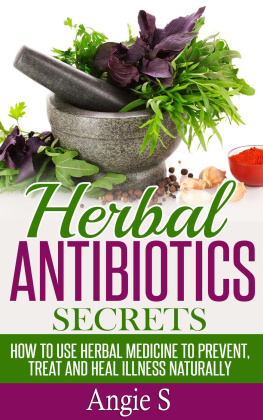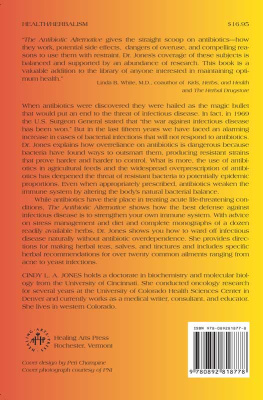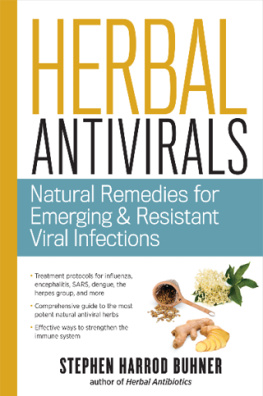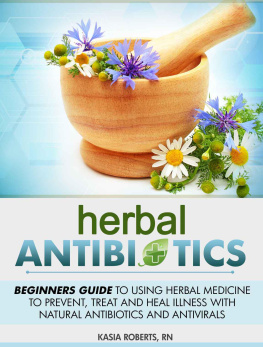HERBAL ANTIBIOTICS
What BIG Pharma Doesnt Want You to Know
How to Pick and Use the 45 Most Powerful Herbal Antibiotics for Overcoming Any Ailment
By Mary Jones
Copyright 2016 by Mary Jones All rights reserved. Printed in the United States of America.
Copyright: No part of this publication may be reproduced without written permission from the author, except by a reviewer who may quote brief passages or reproduce illustrations in a review with appropriate credits; nor may any part of this book be reproduced, stored in a retrieval system, or transmitted in any form or by any means electronic, mechanical, photocopying, recording, or other without prior written permission of the copyright holder.
The information in this book is true and complete to the best of our knowledge. All recommendations are made without guarantee on the part of the author. The author disclaims any liability in connection with the use of this information.
First Printing, 2015 Printed in the United States of America

Healthy people eating healthy food should never need to take an antibiotic
- Joel Fuhrman , American author, physician, speaker
TABLE OF CONTENTS
INTRODUCTION
Herbal antibiotics among other medicines have been used by healers for centuries to ward off a wide range of ailments. These natural remedies have steadily become more popular in recent years, and arevery close to becoming a mainstream treatment . This is because bacteria have become resistant to man made products, and its only by returning to the more natural ingredients, that we can build up immunity to them.
This guide will look at how to ward off illness and infection using these herbal remedies , and the abundance of benefits that you will experience from switching. Once you have read all of the data contained in the chapters below, you will never look back!
An antibiotic has been defined by medicinenet.com as; A drug used to treat infections caused by bacteria and other microorganisms. Originally an antibiotic was a substance produced by one microorganism that selectively inhibits the growth of another. Synthetic antibiotics, usually chemically related to natural antibiotics, have since been produced that accomplish comparable tasks.

Antibiotics were originally compounds made from all natural ingredients; before they became the liquid or pill we know them as today. There are many common ingredients in these herbal medications ones that you may recognize.
The fifteen most common are:
- Acacia
- Aloe
- Cryptolepis
- Echinacea
- Eucalyptus
- Garlic
- Ginger
- Goldenseal
- Grapefruit Seed Extract
- Honey
- Juniper
- Liquorice
- Sage
- Usnea
- Wormwood
To find out more about how these work within the medications, and how they can be beneficial to you, please read on. This is the most extensive guide on this topic that youll be able to find. All the information is guideline; you must consult your doctor before using these remedies.
Watch the following video on Herbal Antibiotics
CHAPTER 1
CONTROVERSIAL FACTS ABOUT BACTERIA
Bacteria may only consist of a single cell, but they are amazingly complex. Most of us know bacteria as germs , invading our bodies and making us ill, but actually they co-exist with us a lot of the time helping to maintain our atmosphere. In fact, millions of bacteria live on the skin, in the intestines and on the genitalia. These are known as good bacteria and do not cause disease they are actually good for our health.

That being said, bacteria can lead to illness . A report conducted by the CDC (Centre for Disease Control ) in 2011 found that 1 in 6 Americans 48 million people get sick from forborne diseases caused by bacteria, 128,000 are hospitalised and 3,000 people die.

The most common diseases that are caused by bacteria are :
- Escherichia coli and Salmonella cause food poisoning.
- Helicobacter pylori cause gastritis and ulcers.
- Neisseria gonorrhoeae causes the sexually transmitted disease gonorrhea.
- Neisseria meningitides causes meningitis.
- Staphylococcus aureus causes a variety of infections in the body, including boils, cellulitis, abscesses, wound infections, toxic shock syndrome, pneumonia, and food poisoning.
- Streptococcal bacteria cause a variety of infections in the body, including pneumonia, meningitis, ear infections, and strep throat.
The four main types of bacteria that can cause illness:
- Bacilli shaped like a rod with a length of around 0.03mm. Causes illness such as Typhiod and Cystitis.
- Cocci shaped like a sphere with a diameter of approximately 0.001mm. Cocci bacteria can arrange themselves in pairs, long lines or tight clusters causing diseases such as Staphylococci and Gonococci.
- Spirochates shaped like tiny spiral, these bacteria cause illnesses like Syphilis.
- Vibrio shaped like a comma, they cause diseases like Cholera.
Bacterial diseases are contagious and can result in many life threatening issues, such as blood poisoning, kidney failure and toxic shock syndrome. The symptoms of these diseases vary, but a very classic sign of a bacterial infection is fever . You will likely experience chills, headaches, a stiff neck, irritability, diarrhea, nausea and vomiting, a rash, abdominal pain, a sore throat, ear pain, coughing, weight loss, fatigue, body aches, lesions, bloody urine, abscesses, muscle spasms, chest pain and joint pain.
The first step to curing these diseases is via prevention. There are vaccinations available for some bacterial diseases, such as meningitis, pneumonia, tetanus and rabies. You can also be sure to wash your hands and cover your mouth when you cough to help the spread, but if you manage to get one anyway, you are likely to be prescribed with antibiotics.
There are alternative treatments to help with bacterial diseases herbal antibiotics which can help you fight off these infections . The following remedies are recommended:
- Probiotics they increase the bodys good bacteria and reduce the function of the bad ones. They are great for treating bacterial vaginosis, intestinal and stomach infections, etc.
- Aloe Vera Aloe gel that is extracted from the aloe plant can be used for treating internal infections bacterial skin infections, vaginal and urinary tract infections, etc.
- Turmeric Turmeric powder combined with milk is great for respiratory infections due to the high antioxidant content in the curcumin.
Next page








